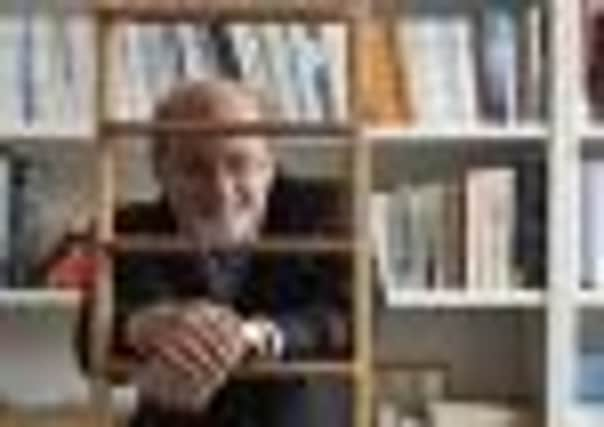Interview: Salman Rushdie on the release of the film version of Midnight Children


When we meet in London to discuss the movie version of Rushdie’s acclaimed novel Midnight’s Children, though, Heller’s “hatchet-job” – as it’s been termed – hadn’t been published. The conversation did turn to criticism, though, and Rushdie was on fine form, full of eloquent disdain and easy charm, a man with a sense that he has little to prove. I wonder if that’s still the case?
If it is, perhaps it’s the result of two massive undertakings being completed almost in unison. Within a month or so of publication of his autobiography, tackling a profoundly painful period of Rushdie’s life – the impact of the fatwa imposed on him by the Ayatollah Kohmeini after the publication of The Satanic Verses (1988) – the movie of Midnight’s Children, which Rushdie adapted, executive produced and for which he provided the narration, enjoyed a packed premiere at the London Film Festival. The writer took to the stage with director Deepa Mehta and a gaggle of pretty young things who make up the cast, and entertained the audience with ease. Rushdie may have spent nearly a decade in hiding, but he’s also a man who is conspicuously comfortable in the limelight. Likely, this is not entirely unrelated to the vociferous criticism that he attracts.
Advertisement
Hide Ad“I don’t know what to say about literary critics,” he says, raising an eyebrow circumspectly. “I think it’s probably best to say nothing.”
I wondered if he felt that in New York, where he’s been based for the past ten years, there is a more open attitude to writers who branch out into different projects and who maintain a high profile, but he doesn’t seem convinced.
“I think it used to be the case that you used to get a better ride, that there was a more level playing field in America than here,” he says. “I’m not sure anymore. I think it might be a little better over here and a little worse over there. The world is so shrunk now, you’ve got a lot of English critics writing in American magazines so it’s not clear anymore.”
As it transpires, Rushdie’s comments were prescient. Heller is a British writer who, like Rushdie, moved from London to New York around a decade ago. Her vituperative smack-down of Joseph Anton has set the literary pages alight, but Rushdie is known for his spats. There was one (recently resolved in fact) with John le Carré and there have been several others with publishers. Thus far, Rushdie has remained silent on Heller. Perhaps he was telling the truth when he insisted that getting older – he’s 65 – has given him “a kind of liberation from caring” about what other people think.
“Doris Lessing really doesn’t care what the critics say. In fact, she orders her publishers not to send her the reviews and gets cross with them if they do because she doesn’t want that in her head. She’s going where she’s going and that’s where she wants to go. I’m not sure I’m quite at Doris’s level of unconcern because it is genuinely Olympian, but what I think happens at a certain point in your life is that you understand that time is finite – you don’t have that many more years. If you’re lucky there are 15 or 20. If you’re very lucky. It might be ten or five. So then you think, don’t waste time. What is there that you really want to do? Do that. When you’re making decisions like that you don’t really care what people think.”
In a grey wool suit, with a v-neck sweater over his shirt and tie, Rushdie looks like a retired Harley Street physician as much as a literary grandee. His voice is a little hoarse from the manic schedule of promoting Joseph Anton and Midnight’s Children (“It was not planned,” he says. “In fact I did my best to de-plan it”), but it’s clear that he’s enjoying himself. And there is most definitely a sense that this is a man ready to begin a new chapter in his life.
Advertisement
Hide Ad“For a long time after I came out of the tunnel of the fatwa, all I wanted to do was to get back to writing novels,” he says. “Then I would be frustrated because novels would come out but people would want to ask me about the fatwa. I used to resist talking about my life because I felt it was getting in the way of the work I’d just done. Now I think, OK, here it all is. You want to know about it? Here’s everything. And from now on do not f***ing ask me about it because it’s there, it’s there. In that sense it does feel like closure.”
The other part of that closure is the Midnight’s Children film. Rushdie’s audacious and celebrated novel is a magic-realist imagining of India’s partition. It spans from the stroke of midnight and India’s independence in 1947 to the war with Bangladesh in 1971. Combining politics and history, family saga and fantastical imaginative verve, it’s a breathtaking book. The film is obviously historical too, but Rushdie insists it’s also relevant to now.
Advertisement
Hide Ad“It interests me that people have responded to it as though it’s not a period piece, although it is,” he says. “There are two things in Indian history – one is the incredible optimism and potential of the place, and the other is the betrayal of that potential, for example corruption. Those two strands intertwine through the whole of Indian history, and maybe not just Indian history. The way we look at any society and see its incredible potential, but we also see the forces eating away at that.